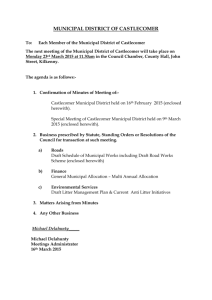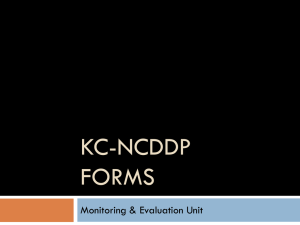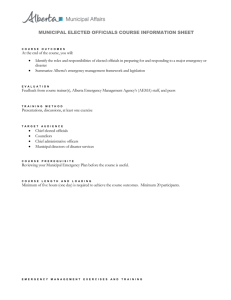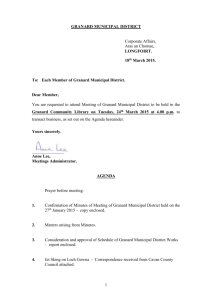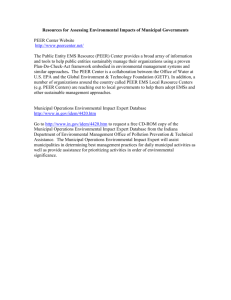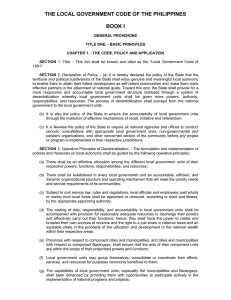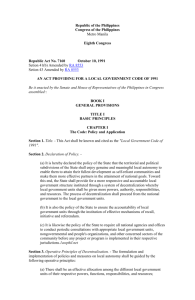File - AMHOP
advertisement
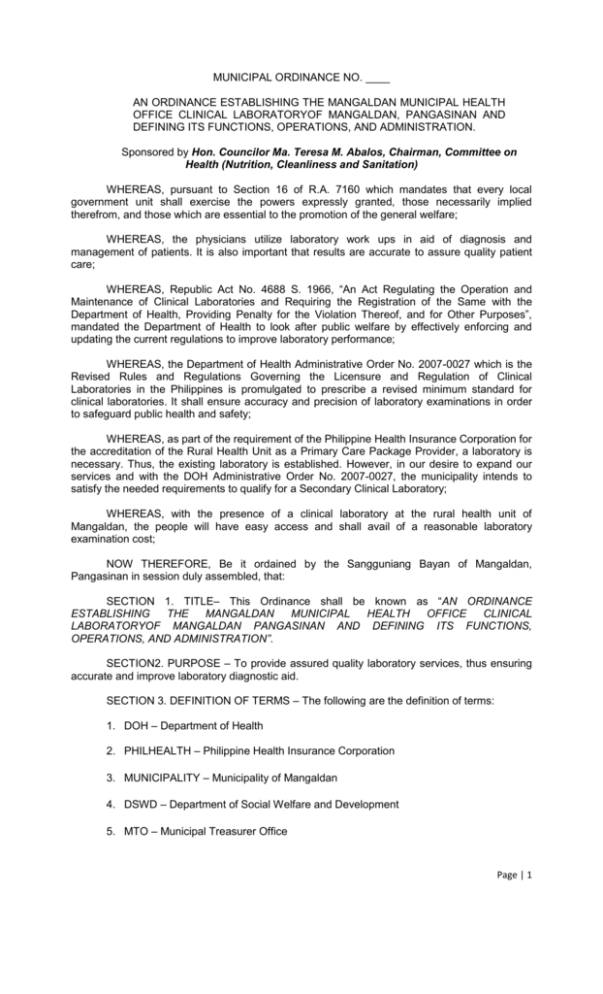
MUNICIPAL ORDINANCE NO. ____ AN ORDINANCE ESTABLISHING THE MANGALDAN MUNICIPAL HEALTH OFFICE CLINICAL LABORATORYOF MANGALDAN, PANGASINAN AND DEFINING ITS FUNCTIONS, OPERATIONS, AND ADMINISTRATION. Sponsored by Hon. Councilor Ma. Teresa M. Abalos, Chairman, Committee on Health (Nutrition, Cleanliness and Sanitation) WHEREAS, pursuant to Section 16 of R.A. 7160 which mandates that every local government unit shall exercise the powers expressly granted, those necessarily implied therefrom, and those which are essential to the promotion of the general welfare; WHEREAS, the physicians utilize laboratory work ups in aid of diagnosis and management of patients. It is also important that results are accurate to assure quality patient care; WHEREAS, Republic Act No. 4688 S. 1966, “An Act Regulating the Operation and Maintenance of Clinical Laboratories and Requiring the Registration of the Same with the Department of Health, Providing Penalty for the Violation Thereof, and for Other Purposes”, mandated the Department of Health to look after public welfare by effectively enforcing and updating the current regulations to improve laboratory performance; WHEREAS, the Department of Health Administrative Order No. 2007-0027 which is the Revised Rules and Regulations Governing the Licensure and Regulation of Clinical Laboratories in the Philippines is promulgated to prescribe a revised minimum standard for clinical laboratories. It shall ensure accuracy and precision of laboratory examinations in order to safeguard public health and safety; WHEREAS, as part of the requirement of the Philippine Health Insurance Corporation for the accreditation of the Rural Health Unit as a Primary Care Package Provider, a laboratory is necessary. Thus, the existing laboratory is established. However, in our desire to expand our services and with the DOH Administrative Order No. 2007-0027, the municipality intends to satisfy the needed requirements to qualify for a Secondary Clinical Laboratory; WHEREAS, with the presence of a clinical laboratory at the rural health unit of Mangaldan, the people will have easy access and shall avail of a reasonable laboratory examination cost; NOW THEREFORE, Be it ordained by the Sangguniang Bayan of Mangaldan, Pangasinan in session duly assembled, that: SECTION 1. TITLE– This Ordinance shall be known as “AN ORDINANCE ESTABLISHING THE MANGALDAN MUNICIPAL HEALTH OFFICE CLINICAL LABORATORYOF MANGALDAN PANGASINAN AND DEFINING ITS FUNCTIONS, OPERATIONS, AND ADMINISTRATION”. SECTION2. PURPOSE – To provide assured quality laboratory services, thus ensuring accurate and improve laboratory diagnostic aid. SECTION 3. DEFINITION OF TERMS – The following are the definition of terms: 1. DOH – Department of Health 2. PHILHEALTH – Philippine Health Insurance Corporation 3. MUNICIPALITY – Municipality of Mangaldan 4. DSWD – Department of Social Welfare and Development 5. MTO – Municipal Treasurer Office Page | 1 6. Clinical Chemistry– is the area of clinical pathology that is generally concerned with analysis of bodily fluids. 7. Hematology – also spelled haematology, is the study of blood, the blood-forming organs, and blood diseases. Hematology includes the study of etiology, diagnosis, treatment, prognosis and prevention of blood diseases that affect the production of blood and its components, such as blood cells, hemoglobin, blood proteins and the mechanism of coagulation. 8. Immunohematology – more commonly known as blood banking, is a branch of hematology which studies antigen-antibody reactions and analogous phenomena as they relate to the pathogenesis and clinical manifestations of blood disorders. 9. Microbiology – is the study of microscopic organisms, either unicellular (single cell), multicellular (cell colony), or acellular (lacking cells). Microbiology encompasses numerous sub-disciplines including virology, mycology, parasitology and bacteriology. 10. Immunology – is a branch of biomedical science that covers the study of all aspects of the immune system in all organisms. It deals with the physiological functioning of the immune system in states of both health and diseases; malfunctions of the immune system in immunological disorders (autoimmune diseases, hypersensitivities, immune deficiency, transplant rejection); the physical, chemical and physiological characteristics of the components of the immune system in vitro, in situ and in vivo. 11. Clinical microscopy – performs scientific analysis on non-blood body fluids such as urine, semen and stool. 12. Histopathology – refers to the microscopic examination of tissue in order to study the manifestations of disease. Specifically, in clinical medicine, histopathology refers to the examination of a biopsy or surgical specimen by a pathologist, after the specimen has been processed and histological sections have been placed onto glass slides. 13. Cytology – is the study of cells. It is a branch of life science, which deals with the study of cells in terms of structure, function and chemistry. 14. Toxicology – is a branch of biology, chemistry and medicine (more specifically pharmacology) concerned with the study of the adverse effects of chemicals on living organisms. 15. Endocrinology – is concerned with study of biosynthesis, storage, chemistry, biochemical and physiological function of hormones and with the cells of the endocrine glands and tissues that secrete them. 16. Molecular biology – is the branch of biology that deals with the molecular basis of biological activity. This field overlaps with other areas of biology and chemistry, particularly genetics and biochemistry. Molecular biology chiefly concerns itself with understanding the interactions between the various systems of a cell, including the interactions between the different types of DNA, RNA and protein biosynthesis as well as learning how these interactions are regulated. 17. Cytogenetics – is a branch of genetics that is concerned with the study of the structure and function of the cell, especially the chromosomes. It includes routine analysis of G-branded chromosomes, other cytogenetic banding techniques, as well as molecular cytogenetics such as fluorescent in situ hybridization (FISH) and comparative genomic hybridization (CGH). Page | 2 18. Analytical chemistry – is the study of the separation, identification and quantification of the chemical components of natural and artificial materials. 19. Clinical Pathologist – is a person specializing in Pathology who seek to figure out the causes of and solutions to diseases. This field involves looking at samples of body fluids and secretions and conducting lab tests. 20. Anatomic Pathologist – is a medical specialist who is concerned with the diagnosis of disease based on the macroscopic, microscopic, biochemical, immunologic and molecular examination of organs and tissues. 21. CHD – acronym for Center for Health Development 22. Clinical Laboratory – a facility where tests are done on specimens from the human body to obtain information about the health status of a patient for the prevention, diagnosis and treatment of diseases. These tests include, but are not limited to, the following disciplines: clinical chemistry, hematology, immunohematology, microbiology, immunology, clinical microscopy, histopathology, cytology, toxicology, endocrinology, molecular biology, and cytogenetics. Other functions of the clinical laboratory are to provide consultative advisory services covering all aspects of laboratory investigation including the interpretation of results and advice on further appropriate investigation. Facilities that are involved in the pre-analytical processes, such as the collection, handling or preparation of specimens, or act as a mailing or distribution center, such as in a laboratory network or system are also considered to be a part of a clinical laboratory. The total testing process includes pre-analytical, analytical and post-analytical procedures. 23. Institution – a corporate body or establishment organized for an educational, medical, charitable or similar purpose. 24. License – the document issued by the DOH to an individual, agency, partnership, or corporation that operates a clinical laboratory upon compliance with the requirements set forth in the DOH Administrative order No. 2007-0027. 25. Licensee – the individual, agency, partnership or corporation to whom the license is issued and upon whom rests compliance with the Administrative Order no. 20070027. 26. LTO – acronym for License To Operate. It also refers to the license. 27. Routine Tests – the basic, commonly requested tests in the laboratory, the results of which are not required to be released immediately upon completion. It shall follow the usual procedures and system in the laboratory. SECTION 4. COVERAGE– The Mangaldan Clinical Laboratory shall serve the people within the territorial jurisdiction of the Municipality of Mangaldan and extend its services to people from other municipalities. SECTION 5. SERVICES OF THE MANGALDAN CLINICAL LABORATORY– The Laboratory clinic shall provide the following laboratory diagnostic services: a. b. c. d. e. f. g. h. i. Urinalysis Fecalysis Complete Blood Count Platelet count Blood typing Gram Staining Sputum Microscopy Skin Slit Smear (under the Leprosy Program) Blood Chemistry: a. Blood Glucose Substance Concentration Page | 3 b. c. d. e. f. g. h. i. j. k. l. m. Blood Urea Nitrogen Blood Creatinine Concentration Blood Total Cholesterol Concentration Blood Uric Acid Concentration Blood Triglyceride Concentration High Density Lipoprotein/ Low Density Lipoprotein Concentration AST or SGOT –aspartate aminotransferase ALT or SGPT – alanine aminotransferase Serum Sodium Concentration Serum Chloride Concentration Serum Potassium Concentration Hepatitis B surface Antigen determination SECTION 6. GENERAL GUIDELINES: Standards: Every Clinical Laboratory shall be organized to provide quality, effective and efficient laboratory services. 1. Human Resources: a. The Clinical laboratory shall be headed and managed by a pathologist, certified either as a Clinical Pathologist, an Anatomic Pathologist, or both by the Philippine Board of Pathology. b. The head of the laboratory shall have administrative and technical supervision of the activities in the laboratory. c. The head of the laboratory shall supervise the staff in accordance to the standards set by the Philippine Society of Pathologists. d. There shall be an adequate number of medical technologists and other health professionals with documented training and experience to conduct the laboratory procedures. e. There shall be staff development and continuing education program at all levels of organization to upgrade the knowledge, attitude and skills of staff. SECTION 7. SERVICE FEE–A corresponding service fee will be billed to cover laboratory supplies and reagents used in the different laboratory tests. The patient shall pay for the services rendered as follows: a. Blood Chemistry ALT(Serum Glutamate Phosphate) AST( Serum Glumate Phosphate) BUN (Blood Urea Nitrogen) Creatinine Blood Uric Acid Chloride Potassium Sodium Calcium Fasting Blood Sugar Random Blood Sugar Cholesterol High Density Lipoprotein (HDL) Low density Lipoprotein (LDL) 200.00 200.00 120.00 120.00 120.00 180.00 180.00 180.00 180.00 100.00 80.00 120.00 250.00 250.00 b. Hematology CBC with Platelet (manual) Blood typing Platelet count Complete Blood Count (manual) Hemoglobin Hematocrit CBC (automated) 100.00 100.00 100.00 80.00 50.00 50.00 200.00 Page | 4 c. Serology HBsAG 200.00 d. Bacteriology AFB Stain Gram Stain (CSW) Gram Stain 50.00 40.00 50.00 e. Other Tests: Fecalysis Pregnancy Test Urinalysis Skin Slit Smear 50.00 150.00 50.00 50.00 SECTION 8. INCREASE IN FEE– The service fee shall increase from time to time based on current prevailing prices of laboratory reagents and supplies as approved by the Sangguniang Bayan. SECTION 9. EXEMPTIONS– The following patients are exempted from paying fees but limited to once a year availment of free laboratory services for blood chemistry and maximum of four times CBC and urinalysis per year per member of the family as cited in this section: 9.1 PhilHealth sponsored member/dependent 9.2 Indigent on Category D with a duly secured Certification from DSWD and duly approved by the Local Chief Executive. MSWD requirements for issuance of Certificate of Indigency: a. Certificate of Indigency from barangay b. Interview and assessment of MSWD 9.3 Exceptional and meritorious cases as determined and approved by the Local Chief Executive; 9.4 DOTS patients (SPUTUM EXAM ONLY) 9.5 Pedicabs and motorized drivers (SPUTUM EXAM ONLY) SECTION 10. DISCOUNTED RATES. 10.A. Twenty percent (20%) discount will be given to the following: Senior Citizens Solo Parents (with IDs) Person With Disability Volunteer Workers such as Barangay Tanods, Barangay Health Workers, Day Care Workers, Barangay Service Point Officers, Barangay Nutrition Scholars, Barangay Electrician, Barangay Utility Workers, Drivers Government Employees including Public School Teachers 10.B. Mangaldan Local Government Unit employees, and elected Municipal and Barangay Officials including the Barangay Secretary and Barangay Treasurer will be given fifty percent (50%) discount. Page | 5 10.C. Only laboratory tests requested by the physician will be honored and included in the discounted rates. SECTION 11. WHERE TO PAY– The patient will pay directly to the Municipal Treasurer’s Office or his duly authorized representative assigned in the Municipal Health Office. SECTION 12. CREATION OF THE MUNICIPAL CLINICAL LABORATORY TRUST FUND – A trust fund shall be created where all laboratory fees and as well as donations obtained from public and private individuals, organization and corporations, both foreign and domestic, collected from the services rendered at the Municipal Clinical Laboratory shall be deposited in the Municipal Clinical Laboratory Trust Fund Account. SECTION 13. DISPOSITION OF MUNICIPAL CLINICAL LABORATORY TRUST FUND – The management and disposition of the trust fund shall be governed by the following: 13.1 The disbursement and liquidation of the trust fund shall be in accordance with pertinent government accounting and auditing rules and regulations and to be audited accordingly by the local COA auditors: 13.2 A separate book of accounts shall be maintained by the Municipality for this purpose. 13.3 The allocation, disbursements and uses of the said trust fund, in addition to the local health fund that will be appropriated for the laboratory services of the Municipal Health Office, shall be based on the following: a. Improvement of the Laboratory Services– About sixty percent (60%) of the said trust fund shall be used to improve the center and its service offerings. This will include among others, the following: repair, maintenance and/or upgrading of facilities and equipment; purchase of reagents and related commodities; purchase of supplies, articles and related operating requirements; and provision of human resource development and manpower support; and b. Forty percent will be allocated for the remuneration for the retainer’s fee of the Pathologist and the contractual medical technologists. c. The financial report in the use and management of Municipal Clinical Laboratory Fund must be furnished the Sangguniang Bayan office on an annual basis. SECTION 14. SUPERVISION AND MANAGEMENT – The clinical laboratory shall be under the supervision of the Clinical Pathologist with the assistance of the Municipal Health Officer. Advisory management will be under the local health board. SECTION 15. BUDGET– The budget for the operations and maintenance of the clinical laboratory shall come from the following: 1. The local health fund that will be appropriated for the LGU under the laboratory service of the Municipal Health Office and similar appropriations provided for the Annual Budget of the Local Government subject to the approval of the Local Legislative Council. 2. The trust funds that shall augment the financial requirements needed for the operations and maintenance of the said clinical laboratory. SECTION 16. CONTINUING EDUCATION AND ADVOCACY PROGRAM– The MHO shall include in their annual plans and programs the continuing education of personnel and advocacy program regarding the improvement and proper management and sustenance of the clinical laboratory. SECTION 17. COMPLIANCE OF MINIMUM REQUIREMENT– The Local Chief Executive (LCE) shall see to it through the recommendation for the Pathologist and the MHO to Page | 6 comply with the minimum requirements set by DOH regarding the operations of the clinical laboratory. SECTION 18. REPEALING CLAUSE– All ordinances, resolutions, rules and regulations, or part thereof, whose provisions are in conflict with or contrary to the provisions of this Ordinance are hereby deemed repealed, amended and modified accordingly. SECTION 19. SEPARABILITY CLAUSE– If any provision of this ordinance or any part thereof be declared unconstitutional or invalid, other provisions or any part thereof not affected shall continue to be in full force and effect. SECTION 20. EFFECTIVITY– This Ordinance shall take effect fifteen (15) days after its approval and after due compliance with publication requirements. APPROVED. Page | 7 The present laboratory tests offered by the Municipal Health Office are: Laboratory Tests Urinalysis Complete Blood Count Fecalysis CBC with platelet count (Manual) CBC with platelet count (Automated) Platelet count Sputum examination (free for TB suspect patients and their follow up exams) Gram staining (for GROs) Blood typing Present Rates 30.00 60.00 Proposed Rates 50.00 80.00 Provincial Rate 60.00 200.00 30.00 90.00 50.00 100.00 60.00 200.00 - 200.00 - 50.00 50.00 100.00 100.00 50.00 40.00 free 50.00 40.00 100.00 PROPOSED LABORATORY CHARGES TESTS PROPOSED LABORATORY RATES PROVINCIAL RATE GLUCOSE P 100 140.00 CHOLESTEROL P 120 200.00 UREA P 120 140.00 URIC ACID P 120 140.00 CREATININE P 120 140.00 TRIGLYCERIDES P 220 200.00 LDL/ HDL CHOLESTEROL P 250 200.00 SGOT P 200 140.00 SGPT P 200 140.00 SODIUM P 180 140.00 POTASSIUM P 180 140.00 CHLORIDE P 180 RANDOM BLOOD SUGAR P 80 Page | 8


